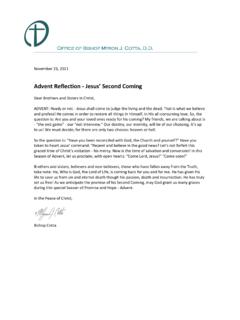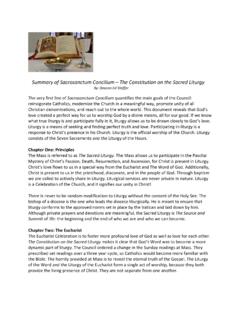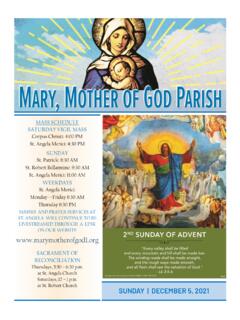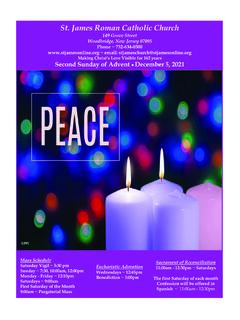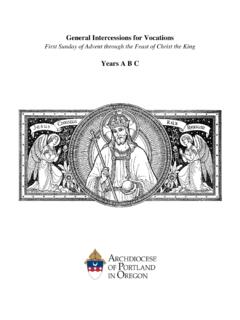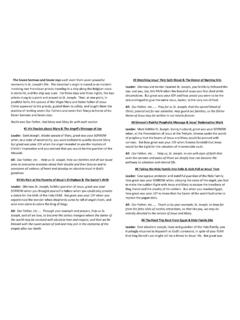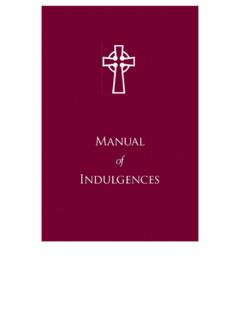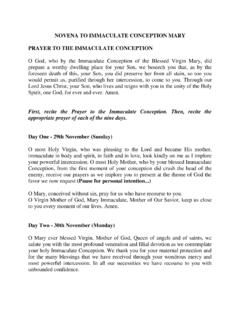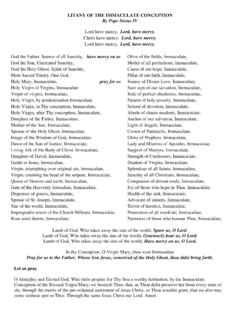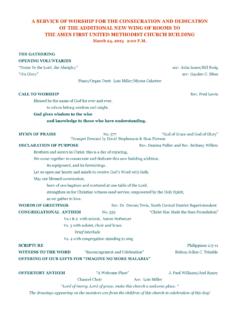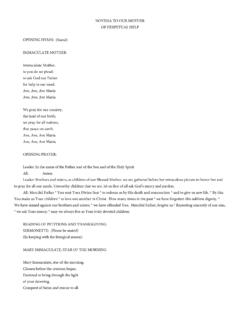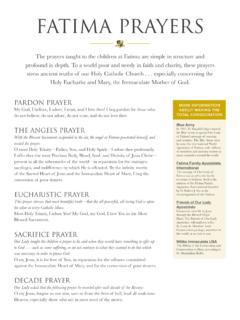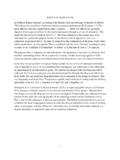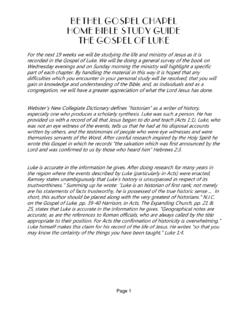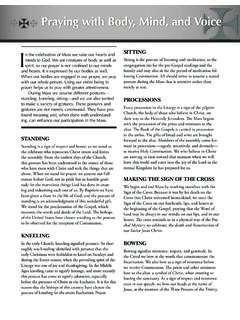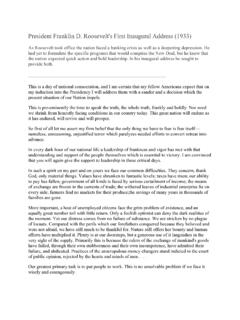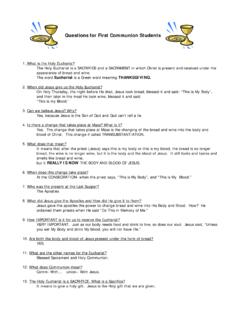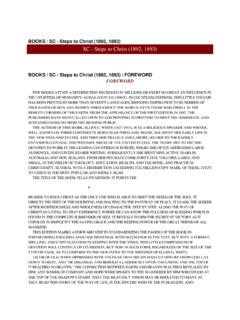Transcription of First Communion Preparation
1 First Communion Preparation St. William Catholic Church 2020 General Guidelines Preparation for Eucharist The following guidelines have been established by the Diocese of Birmingham, Office of Religious Education, and apply to all Preparation programs for children preparing for their initial reception and celebration of the Sacrament of Eucharist. Parents have the Primary Role in Passing on the Faith All programs preparing children for the initial reception of the sacraments should involve parents, consistent with their primary role in the religious education of their children. (Declaration on Christian Education #3). Therefore, priests and teachers are to arrange programs to help parents to fulfill their role in pre-paring children for the sacraments.
2 Participation in such programs should be mandatory for all parents who have children preparing for the sacraments. Children whose parents do not par-ticipate in the Preparation program should not be admitted to the reception of the sacraments without serious pastoral consideration. The pastor, in close consultation with parents, teachers, and those involved in the sacramental Preparation of children has the right to decide the time and manner of the celebration of the Sacrament according to proper liturgical norms. This decision should be based on the child s understanding of, and desire for the Sacrament. Age for First Communion Generally speaking the formal Preparation for the First reception of the Eucharist is be-tween ages 6 - 8. However, the age of reception is left to the discretion of the parents, after con-sulting with priest and teachers.
3 Fasting Before Communion To honor Jesus, we do not eat or drink anything, unless it is water or medicine, for one hour before we receive Holy Communion . This fast reminds us that we hunger for Christ, and we honor Jesus with this fasting Preparation for Mass. Celebration of First Eucharist Unless there are serious pastoral reasons that indicate the contrary, a child s celebration of First Eucharist should reflect the communal nature of church through both family and parish celebrations. Requirements In order to receive First Eucharist, the child should have sufficient knowledge and desire as prescribed by St. Pope Pius X in Quam Singulari. What a child needs to know for the reception of First Eucharist is simple and reasonable, a child s faith and a child s desire.
4 Therefore, the Diocese stipulates that: The child should know who Jesus is: Jesus is the Son of God; Mary is His mother. Jesus taught people how to follow God s rules of love. Jesus gave us the Eucharist at His Last Supper with His friends. He died on the cross out of love for us. He rose from the dead. Jesus is with God, His Father. Jesus sent the Holy Spirit to always help God s Family. The child should be able to distinguish between the Eucharist bread and ordi-nary bread. When Mass begins, the bread and wine are not Jesus. At Mass, the bread and wine become Jesus at the consecration when the priest says the words of Jesus: This is My body and This is My blood. The bread and wine do not seem different in any way after they become Jesus.
5 They still seem to be bread and wine; they look and taste and feel the same, but they are really Jesus. When you receive just the Host in Communion , you are really receiving Jesus. Jesus is fully present in the Host. Jesus is also fully present when you receive Communion from the chalice. The child should desire to receive the Eucharist. Jesus gave us the Eucharist because He loves us. People want to receive Jesus. They love Jesus. The want Jesus to help them show love. They want to share in the Meal of God s Family. Why Do We Receive Communion ? by Most Reverend Daniel E. Pilarczyk, Archbishop of Cincinnati; Why Be a Catholic Series What Happens at Mass? The usual occasion to receive Holy Communion is during Mass, so if we want to understand why we receive Communion , we have to remember what the Mass is all about.
6 When the Christian community gathers to celebrate Mass, it finds itself at the foot of the cross. Jesus faithfulness to the will of His Father was the central feature of His life, and it brought Him to the final act of dedication when He accepted even death at the hand of His enemies in order to remain faithful to the Father. The Mass is a new presentation of that sacrifice that Jesus offered at the end of His earthly life. Jesus is there, still offering Himself to His heavenly Father in obedience and love. But Jesus does not offer His sacrifice alone. The members of His community, the Church, offer themselves in union with His sacrifice. They unite their own limited and flawed faithfulness with His perfect faithfulness. They offer their joys and sorrows, their achievements and their failures, their hopes and their fears.
7 Jesus responds to their faithfulness by uniting them still more deeply with Him. He gives them Himself in Holy Communion so that His dedication to the will of the Father can root itself more and more in their lives. As a result of receiving Jesus, body and blood, soul and divinity, in the Eucha-rist, His faithful followers leave the Eucharistic celebration better able to reflect the love and obe-dience and faithfulness of Jesus in their actions and relationships of each day. The Eucharist is one of the three sacraments of initiation because our participation in the sacrifice of Christ and our constant growth in His life and faithfulness and generosity are fundamental elements of our mem-bership in His people. No one is fully united with Christ unless one is united with Jesus sacrifice of Himself on the cross, unless one s life is constantly nourished by the self-giving life of Christ.
8 Why Bread and Wine? The central point of the Eucharist occurs when the priest pronounces the words of Jesus ( This is my Body, This is my Blood. ) over the bread and wine during the Mass. There are many reasons why Jesus chose to use these elements for the sacrament of self-giving and growth. First of all, Jesus instituted the sacrament of the Eucharist at the Last Supper when He was celebrating His last meal with His disciples. Even before He died He was offering Himself to His heavenly Father, using bread and wine to signify the separation of His body and blood that would take place at His death. The Church uses bread and wine to teach about Christ s death because Christ used them for that purpose. The bread and wine of the Passover supper had a special significance to Jesus people.
9 They used it to recall their liberation from slavery and their continued dedication to God. By using bread and wine as signs of His won sacrifice, Jesus wanted to indicate that His death was a sign of His dedication to His Father and a source of new life and liberation that would lead to the joyful and eternal banquet of heaven. In addition to that, of course, bread and wine were the ordinary food of people of that time and place. By changing bread and wine into His body and blood, Jesus wanted to signify that, just as we need ordinary food for our bodies, so we need regular nourishment from His life for our souls. Just as we grow weak without physical food, so we grow weak without the strength that comes from Him. What Does It Mean to Receive?
10 When we receive Holy Communion we are expressing our union with the sacrifice of Christ on the cross and we are opening ourselves up to a still deeper relationship with Jesus. If we have ended our relationship with Jesus by serious sinfulness, we cannot participate fruitfully in the Eucharist because our souls are out of touch with Jesus. We need to have our sins forgiven First before our lives can grow again in Him. But there is more to Holy Communion than our individual relationship with the Lord. The Eucha-rist is also the bond of unity for the Church. When we grow in our closeness to Jesus, we also grow in our closeness to everyone else who shares the life of Jesus. It is the whole Body of Christ, the Church, that is nourished and that grows when its members share in the Eucharist.
